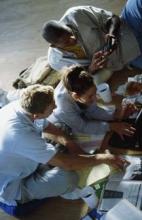The incidence of all meningococcal serotypes is in decline, except for the spike in serogroup B on college campuses.
"Although we do not expect an increase in MenB outbreaks on college campuses, the CDC has recently formed a meningococcal outbreak work group," said Dr. Manisha Patel, medical officer with the Centers for Disease Control and Prevention’s Meningitis and Vaccine Preventable Diseases Branch.
Five school-based meningitis B (MenB) outbreaks have been reported since 2009, involving four undergraduates at the University of California–Santa Barbara (UCSB) since November 2013 and eight cases from March to November 2013 among students or persons with links to Princeton University.
There is no licensed MenB vaccine in the United States, but the Princeton isolates expressed two of the four antigens (fHBP and NHBA) in sufficient quantities to suggest protection with Bexsero, a recombinant MenB vaccine (Novartis) recently licensed in Europe, Australia, and Canada, Dr. Patel said at the CDC’s most recent Advisory Committee on Immunization Practices meeting.
An on-campus vaccination campaign that continued through Feb. 20, 2014, resulted in 95% coverage for dose 1 and 88% coverage for dose 2 among 5,772 at-risk persons.
Based on mandatory follow-up reporting to the Food and Drug Administration, the serious adverse event rate was 2.0/1,000 vaccinees following the first dose and 0.2/1,000 vaccinees after the second. None of these events have been determined to be causally related to the vaccine, and there have been no concerning patterns among other types of reported adverse events, she said.
The target population at Princeton includes all undergraduates, graduate students living in dormitories, at-risk students, faculty, and staff, as well as spouses or parents living with undergraduates in dorms.
The attack rate during the outbreak was 134/100,000 among undergraduates. No deaths occurred, but two cases had sequelae of neurocognitive deficit or hearing loss, Dr. Patel said.
The attack rate at UCSB was 21.1/100,000 among 17-22 years olds, or 234-fold higher than the incidence rate for this age group in the general population. All four students recovered, but one had bilateral foot amputation.
Procurement of the Bexsero vaccine began in August 2013 with the initial proposal to the FDA to explore its use in an outbreak under an expanded access Investigational New Drug (IND) protocol, Dr. Patel explained. Other steps along the way included isolate testing by Novartis, epidemiologic investigations, CDC Institutional Review Board approval, and issuance of an FDA safe to proceed letter before contractual agreements between the CDC, Novartis, and Princeton University were finalized in December 2013.
A CDC-sponsored expanded–access IND protocol was subsequently approved by the FDA for Bexsero use at UCSB. First-dose vaccinations began Feb. 24 – this time with an estimated 20,000 persons eligible for vaccination, Dr. Patel said.
"Vaccination is now possible in response to meningococcal B outbreaks," she said.
Dr. Peter Dull, head of meningitis cluster, Novartis Vaccines and Diagnostics, Cambridge, Mass., agreed that the vaccinations are a great example of collaboration among entities, but he cautioned ACIP members to take a step back.
"If you look at the timeline Dr. Patel laid out as to how long it took to walk through the steps, yes, there’s work with the FDA approving the IND, and yes, there’s set up of the implementation campaign," he said. "But also on the company side, we’re not in surge capacity that you can pick up the phone, and we can label and ship unlicensed vaccines in the U.S.A. very quickly.
"These outbreaks clearly happen fast, and we do have to have a more sustained solution to this."
Dr. Patel pointed to the challenges of using an unlicensed vaccine including the logistics of vaccine procurement and implementation, with the mandate to meet safety follow-up requirements. Plus the IND preparation process must address specifics of the outbreak.
The new meningococcal outbreak work group will bring together federal vaccine experts, state public and college health officials, university administrators, and insurance industry representatives. The group is tasked with reviewing recent epidemiology data of meningococcal disease and outbreaks, considering options for updating the current meningococcal outbreak guidelines, and developing guidance for the use of meningococcal vaccines, both licensed and unlicensed in an outbreak, she said.
Dr. Patel reported having no financial disclosures.


